#Anyways yeah this is my ramble
Explore tagged Tumblr posts
Text
Hi hello so idk if anyone else has said anything about this but I'm making a post about it cause I can (MILD TF EARTHSPARK SPOILERS AHEAD???)
-
-
-
-
-
-
-
-
So recently I got into Transformers: Earthspark and the show is so gOOD LIKE AAAAAA- the details in it is phenomenal and the dialogue they have for the characters is great. But one thing I noticed the other day was with the GHOST logos on Optimus Prime and Megatron were different than each other

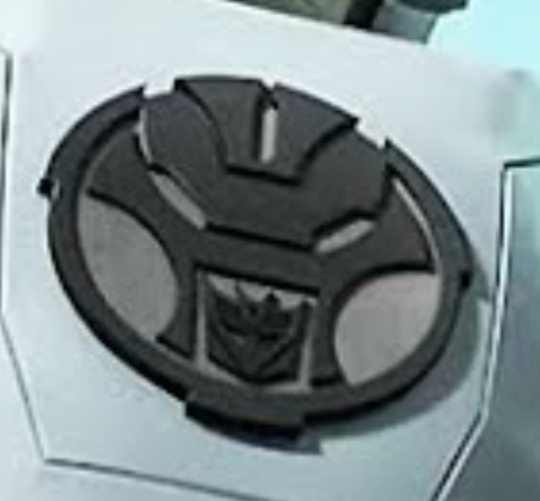
I noticed how in the Ghost logo for Optimus, it has the Autobot insignia while with Megatron, it has the Decepticon insignia. Which would make sense, the logo goes with their corresponding sides. HOWEVER. HOWEVER when thinking about this more, it kinda hurts; Megatron should have the Autobot insignia, not the Decepticon insignia.
The reason I say this is because in Episode 12: Outtakes, Jawbreaker goes and asks how Elita-1 and Megatron got their alt modes. Megatron went first with telling the story on how he got his alt mode and how he chose it just before the end of the war and this was when he stopped fighting against Optimus and joined him with his faction: Autobots. Megatron had stated when talking about his past that his priorities had changed and wanted something better for future Cybertronians.
Jawbreaker asked how Megatron got Optimus to trust him after the two were enemies, in which Megs responded with "By scanning an Earth vehicle." JB was surprised because he knew that meant Megatron had to give up his Cybertronian alt mode and it didn't seem fair. Megatron agreed because that is what he believed, at first. Megs only changed his alt mode when they had gotten attacked by seekers from in the air, he had no choice but to take the fight to them and scan the last aircraft on the base. With this act, Megatron said he had defended his new friends and proved his loyalty to Optimus. He no longer identified himself as a Decepticon, but people still treated him as such because of his past.
It's not fair with how much Megatron had sacrificed to prove himself, and still be treated unfairly by others. All he wants is a fair world where all Cybertronians, and Terrans, could live peacefully. It's a reason why Megatron had gotten so upset with how poorly they were treating arrested Decepticons and not even trying to give some of them a second chance.
This also is probably why he isn't exactly trusting of Ghost. Ghost keeps many secrets from others and leaves them in the dark with little to no information. Not to mention with all of the shady things that have been going on with them so Megs has valid reasoning not to trust them even though he has been 'working' for them.
Also I would like to rq mention how Ghost has been a thing for like 30 YEARS??? And how Optimus has been with them for that long but Megatron has only been with them for 15. So this also could correspond with how cruddy Ghost treats Megatron since he joined later, he asks a lot of questions, and doesn't exactly like to take BS from them.
TL;DR - Megatron needs to be treated fairly with all the shit he's sacrificed and had to deal with after joining Ghost
#THIS MF NEEDS HELP#Tbh ghost rlly be giving politican vibes with how they act and treat their workers#Megatron needs therapy#Megs needs a break#Like please can this poor old bot have something good happen to him for once#transformers earthspark#tfe#tfe spoilers#earthspark megatron#tf earthspark#Anyways yeah this is my ramble#I'm just a silly goofy aaa when it comes to Megs#no but seriously I can't be the only one who noticed this#long post
25 notes
·
View notes
Text

yeehaw, baby!
#if u know me u knew this was inevitable#kon el#conner kent#tim drake#timkon#im gonna ramble after the boring tags ok#dc comics#fanart#western au#superboy#OK !!!! ITS TIME#so kon. obvs is a cowboy here#definitely a bit of a magnet for trouble but not an outlaw#still not the sort of person the son of the drake family's supposed to be talking to but yk kon's gonna try anyway#on tims end it pretty much follows the same events as the comics bc if it aint broke dont fix it#<- in terms of the whole sneaking out at night to do his own secret detective work thing at least#i have a whole silly story for the rest of it but im not gonna get into it all here lmao#but yeah i love cowboys and actual cowboy history vv much so this probably wont be the last u see of this au ദ്ദി ˉ꒳ˉ )✧#for now this post's rlly just for goofing around with design ideas#my art
11K notes
·
View notes
Text
guys I had this realization the other day that Redwall works really well for reading aloud, and kinda half-remembered something about the author reading to kids? So I looked it up to see if I had made a connection.
And it turns out, yes, actually, because he read aloud to kids at a school for the blind. But all the books they gave him to read were depressing. So he wrote Redwall, a story about heroism and courage and making it through struggles, and filled it with so many sensory, visual details so he could give them something better and I just-- that's so wholesome-- help
#my theory is that all good childrens books are written with LOVE#and he clearly loved these kids#anyway I got kind of emotional at that#as someone who read Redwall as a kid and was inspired to be brave#also I left this in my drafts for a while oops#but yeah I have feelings#redwall#brian jacques#reading#scribe rambles
16K notes
·
View notes
Text
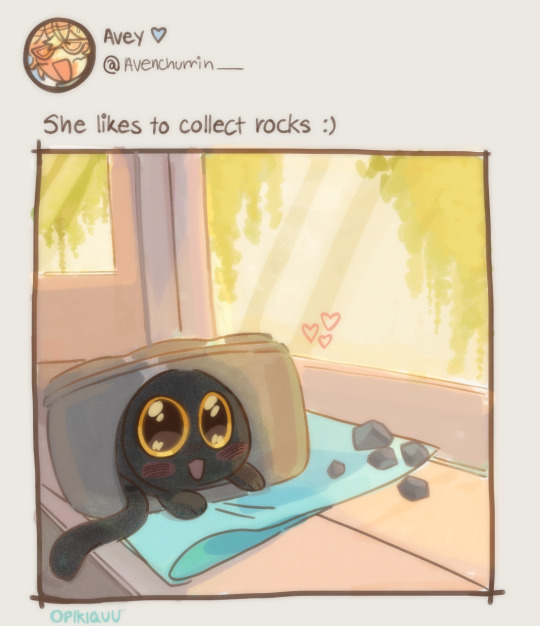
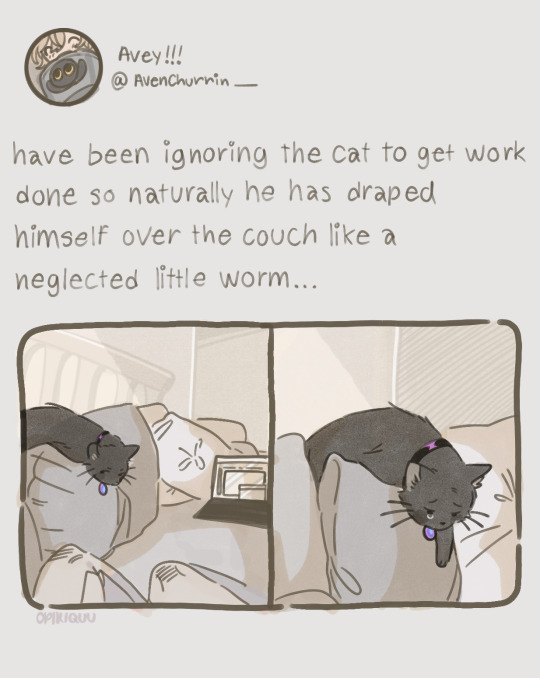

#★ my art#art#honkai star rail#hsr aventurine#aventio#ratiorine#aventurine’s priv part 2 But ratio stole his tablet#Yeah i saw that tablet in that dang music video HES AN IPAD GUY YUCK PEEYEW /j#this is a rare time where you wont see me ramble for eons cuz i dont really have anything to say#hsr dr ratio#happy pride month ill be drawing gay people !!!!!!!!! (What ive been doing anyways)#hsr golden ratio
4K notes
·
View notes
Text

On autonomy, and what it means to be Obliged to Help.
Bonus:

#a homestuck walks into an antechamber and asks#hey is anybody going to make this dynamic wholly deterministic and thus dubiously consensual by its very nature#ANYWAY bigger ramble below. scroll down like usual#isat spoilers#isat#isat fanart#isat siffrin#isat loop#sifloop#THATS RIGHT WE'RE STILL SHIP TAGGING IT BABYYYY#in stars and time#in stars and time fanart#lucabyteart#RAMBLE START: anyway i think loop is wrong here. they have it backwards. as-- in my opinion--#the main reason they could be called back into existence postcanon is because *their* wish for help is still not complete#they still need help. siffrin still needs help. neither of them will ever stop needing help.#they will thus uphold the wish until the end of siffrin's natural lifespan.#that said. what does it mean that loop can be so wholly forced to abide by siffrin's wants?#(assuming the dagger cutscene posession is them being forced to uphold the 'help siffrin' wish via harsh universe logic)#[as opposed to something capricious and cruel the change god did. which feels out of character for the change god to me?]#much like how the island wish and duplicate objects are neutered by simply sliding off people's brains...#is loop subtly ushered toward their wish? obviously it's not a full override (see: the bossfight). but is there any interference?#and if so. so what? does it matter? if they don't notice? is it even real if they don't notice?#and even if they do notice. the universe leads we follow. how much do either of them value their free will in a belief system like that?#the whole game is dedicated to siffrin habitually NOT excersizing his free will. doing things the same Every Time.#Loop ESPECIALLY does this. predetermined predetermined predetermined even in the FACE OF CHANGE. REFUSING. ANY CHOICE.#Maybe they'd even be comforted by having a universe-ordained purpose even if it is subservient. even if its to Him.#(though. i can't see siffrin enjoying the idea that someone is subservient TO them... then all their suffering is his fault...)#loop got into this mess via WANTING too much. no more free will. can't be trusted with it. take it away from them.#but yeah. gets my greasy detective pony hands all over this. and everyone please do remember i like to make characters Outright Wrong A Lot
2K notes
·
View notes
Text

Thanks to artfight, I’ve finally finished a detailed, official dbhc cub reference! :D
(I’ve put his Artifight description below the cut, which has a more detailed explanation of his timeline, lore, and aesthetics! >:3)
-ˋˏ ༻ ❁ OVERVIEW ❁ ༺ ˎˊ-
Name: C.B.F.N.4000 (Cub) Pronouns: He/Him Species: Android Height: 5’9’’ Associated Visual Themes: vex, ghosts, explosions, mischief, scientist aesthetic, potions, potionmaking, sleepy/tired aesthetic, conspiracies
-ˋˏ ༻ ❁ ABOUT ❁ ༺ ˎˊ-
CBFN4000 is an au version of MCYT Hermitcraft’s Cubfan, set in my DBHC (or Detroit Become Hermitcraft) AU! This au is inspired by the 2018 game Detroit Become Human, but not because it really has anything to do with DBH—I simply yoinked the android mechanics and incorporated them into the world of Hermitcraft. It began as a S8 au, and has roughly followed the hermitcraft timeline up to the present!
Cub was the last android made during Season 8. While many of the hermit androids were made at the beginning of season 8 and a few were made for season 9, Cub was finished and activated mid-late Season 8, around the time when Hermits started noticing the Big Moon. Cub’s model ended up being a sloppy experiment in deviation, as Doc suggested they try to transfer deviancy to an android upon activation to try and avoid traumatic situations that might cause an android to deviate violently or upsettingly, such as Etho’s, Tango’s, or Mumbo’s experiences. While this went relatively well initially, it clearly wasn’t very thoroughly thought out, as Xisuma (who is normally so adamant and detail-oriented when it comes to assuring the androids’ safety with experiments like this) wasn’t truly himself due to external manipulation and mostly left a relatively young-deviant Doc to carry out the project himself.
Cub, though adjusting to sentience rather well at first, very quickly became wrapped up in the Big Moon happenings on the server, new personality and inexperience to emotions like fear and ignorance completely overwhelming his young system. He became obsessive over the implications and consequences of the Season 8 Moon Apocalypse, joining the Mooners and spreading his conspiracy theories religiously throughout the server as he descended into madness. The insanity was like a virus to his programming, pervasive and all-engulfing, and Cub’s final attempt to free himself from the Moon’s impact with the Earth—to launch himself on a llama into space via potion-powered TNT(insane btw)— left his hands and feet singed and cracked to ruin.
The experiment, considered a horrific failure by a deeply shameful—and more awake—S9 Xisuma, left Doc and Xisuma with the decision to reset him for the new season, and they ended up pairing him with a hermit like they had done with the other androids until they had found deviancy enough to pursue their own projects. So, at the start of season 9 and fresh after a reset, Cub was paired with Scar. Naturally, because Scar is… Scar, Cub deviated almost instantly after being given to him, and very quickly adopted the iconic lazy, stoic, amused attributes normally associated with Cubfan. Scar’s tendency towards mischief and general shenanigans grew instantly on Cub, and the two were an immediate inseparable pair. So much so that when Scar began rambling one day about his Season 5 Hermitcraft Shenanigans (where deals with the Vex may or may not have been involved), Cub immediately stated he was interested in being in on it. Whatever “it” means. It’s unclear if Cub also made a deal with the vex or became connected to them in some other way, but�� well, he got Doc’s help to trick out his eyes, hair, and back to best fit the part. Scar is very jealous that he can't magically make himself have the same features to match.
Cub is closest with Scar, but he gets along just as well with any of the other hermits! He’s close with Jevin and many of the other redstoners like Etho and Doc, who are the other two androids I’ve put on artfight!
-ˋˏ ༻ ❁ EXTRAS ❁ ༺ ˎˊ-
Cub's eyes can light up in the dark, and he’s the only android who has edited his programming so that the default state of his LED is white, not blue. It still will go yellow and red if his processors are working particularly hard, but he’s replaced the blue setting on his LED with white to better match the Vex vibe. Cub has all of the vibes of a fae. If that’s anything <3
#dbhc#dbhc art#dbhc ref#dbhc cub#cubfan#hermitcraft#cubfan135#hermitcraft au#art escapades#writing everything out in a really succinct/condense way is actually really helpful#I might add Etho and Doc’s artfight descriptions to their own reference pages actually#just because it’s really helpful to have all of the lore in one place LOL#I always wrap up these ideas in my head and save them for when I can make art to reveal the plot dramatically yknow#but for characters that aren’t really my priority right now it’s kind of nice to just get the info down#especially for the people who ask about specific characters a lot#SO ANYWAY#I ramble#if anyone has any opinions on this method of relaying dbhc lore feel free to lmk!#there will obviously be things that I keep hidden :3#Bc sometimes art reveals are the best >:3#but for stuff I might not get to in a while…. yeah#I don’t mind it#ALSO#HILARIOUS TO ME THAT freshly awoken cub reminds me a lot of IRL cub LMAO
1K notes
·
View notes
Text
Been thinking about how Bill legitimately had a horrifying reason (the literal progressive disintegration of the nightmare realm that erases whatever it disintegrates from existence completely) to move himself and his crew into a new dimension. Like that's terrifying. And yet he never utilizes this to his favour. He could have been honest about this with Ford, and you KNOW as long as Bill didn't mention plans of overtaking the earth, Ford would've made the portal for him, both out of Ford's own interest and because Ford when faced with these big moral questions will pull through. But this is a card Bill NEVER plays because although he needs to leave the dimension, he cannot lose face. He can't put aside his pride and admit to the humility that he needs to flee from his dimension, that he's not actually all powerful. And so instead he pretends to be a muse and when Ford figures out something else is going on, instead of being open and humble and saying that his dimension is unravelling, Bill focuses on that he's going to over take earth, that he's actually been a monster all along, surprise Ford!
And part of it is definitely because Bill's built himself up on power and violence and to grovel and earnestly ask for help, to admit that he cannot stop the unraveling of his dimension completely invalidates that; showing vulnerability? Can't do that, even under the guise of lying to get his way. And part of it makes you wonder if it's also a form of self-sabotage, because underneath his deep denial Bill is guilty over what he occurred; he sees himself as a monster and so he'll be that monster, and having people recognize that feels good in the same way that pressing a bruise feels good. But it makes you wonder what would've happened if Bill even just was open about his dimension unravelling and had lied about overtaking the earth.
It's also interesting because although Bill has SOME charisma and can manipulate people decently well (as evidenced by his cult, and pandering to people's desires with Ford, Mabel and Blendin), he refuses to be vulnerable, refuses to not be true to his off-putting self, even when if he was just vulnerable of pretended to not be himself, to put aside the (false) pride he has in himself he would've gotten a portal by now. and part of me wonders if it's because it's this false pride that built on insecurity and denial on who he is he cannot drop that mask.
Further thoughts on this!
#hugin rambles#hugin rambles gf#uhhhh yeah anyways Bills a delightfully complex character#and I think thats why also Bill fell hard for Ford is because Ford was vulnerable with Bill and actually CARED for Bill and got to peer#into the vulnerable bits of Bill and cared for him#but yeah fascinating. rotating him in my head whooo#bill cipher#billford#the book of bill#TBOB#gravity falls#but seriously the idea of Bill becoming honest with Ford instead of being like HAHA I TRICKED YOU bounces around the ol noodle with vigor#like dude thats a HUGELY typical self sabotage thing. like why YES im what people think i am.#hes interesting because hes good at manipulation. but also at the same time bad at it because he refuses to not be himself.#which... yanno i can respect. truth to being yourself even if thats offputting and annoying. but certainly makes it more difficult#re: manipulation. and then there was ford who was just. really into Bill in entirety#congrats! you guys match each others freak and toxic neediness to the t#gravity falls meta
887 notes
·
View notes
Text
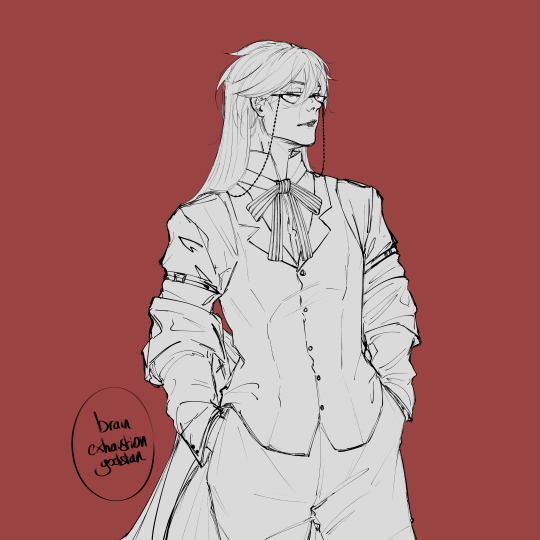
wife
#yeah i'm not dead woo let's celebrate#my art#kuroshitsuji#kuroshitsuji fanart#black butler#black butler fanart#grelle sutcliff#grell sutcliff#anyway i didn't draw SHIT for a good while and when i got back to it i suddenly hated using the flat marker brush???#it's part of what makes my signature distinctive so i used it for that but yeah i switched brushes#oddly enough i'm not hating the more textured look? it gets very pixelated at times but it's not awful#back to the signature- it felt weirdly nice to sign things again#i haven't in a while#if you're one of the very few people who also follow me on instagram you'll know i don't use it on there#and the only art i've been doing these days has been original work so yeah nothing on tumblr#and thus the words 'brain exhaustion god stan' have not been written by this comically large hand in a hot minute#enough rambling this is just grelle art because i love her and i know y'all love her too so i thought it would be a nice comeback piece
2K notes
·
View notes
Text

to my IRL(s) who keeps sending me disco elysium memes despite the fact i haven't played it in months THIS IS BECAUSE OF YOU. HELP ME. If people have ideas on this AU feel free to have fun with it considering I. have only a few!
#zombiecleo#ethoslab#hermitcraft#scopophobia cw#hermitcraft AU#tag ramble time!#don't. worry about the text. yes it's trying to imply that etho can see us and break the fourth wall Don't Worry About It#this AU really was 'i wanna draw hermits in DE outfits who's pathetic and sad enough to b– yeah it's etho.'#'that makes cleo Kim then. I think they'd make it work' and that was it#in my heart it's also an AT so they're working a different case somewhere else in universe. mostly because i don't think them and-#-cuno/cunoesse should exist at the same time.. etho can have a drug addiction but cleo is NOT getting called a faggot /lh#Cleo getting written as 'just cleo' in text is kinda silly i enjoy it. hopefully that wasn't used in the actual game and i forgot about it#art out the oven#art wise this was really fun i locked myself in values jail but the colours turned out reasonable anyway which is always nice#yes cleo has gauges and an undercut <3#[scheduled]#EDIT: oh god. i have to add a tag for this AU#Disco Hermits AU
625 notes
·
View notes
Text
Hot take, I really don’t think we should assign human morals onto animals and call them bad or evil. Fishblr has internalised this idea really well with sharks, and I think that’s good! Sharks don’t deserve all the fearmongering they suffer from in media. But… can we please remember to extend this to other animals too? Even to intelligent animals like dolphins (most commonly bottlenose dolphins) and orcas. It seems to be a counter to pop culture’s tendency to show dolphins as complete angels when they partake in some messed up things, but like…. Dolphins are still animals? They may be able to recognize themselves in mirrors and they may have language and culture and know how to use tools but their intelligence is still on the level of a human child (and how empathetic are those!!??). I see people talk about how evil dolphins are but I never see people talking about other animals the same way, like, why aren’t sea otters and their “evilness” the topic of discussion? :/
#i have seen people saying that its a joke or just a shorthand for saying that an animal is unpredictable.#but two things: is it r e a l l y a joke anymore?#and! if saying that an animal is evil is shorthand for the animal being dangerous or unpredictable; why not just say that!!??#when you call an animal evil it implies that the animal is aware of its actions as being malicious but it commits them anyway#this is rarely ever the case!#calling an animal dangerous or unpredictable better describes what the potential problem might be when you interact with said animal#anyway yeah you dont have to take my rambling to heart#fish#fishblr#biology#zoology#marine biology#shark#sharks#dolphin#dolphins are evil#dolphins
7K notes
·
View notes
Text
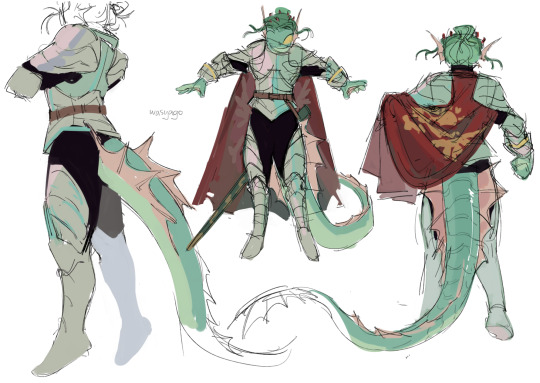
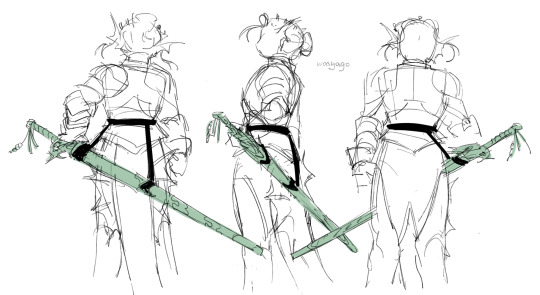
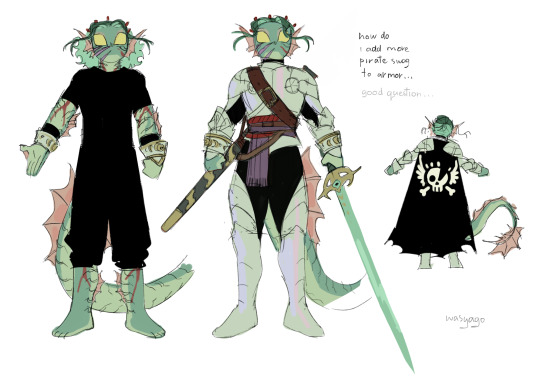
we're at it again🕺
#jrwi riptide#gillion tidestrider#my art#sketch#back on my bullshit woo yeah woo yeah woo yeah#genuinely a lot happier with this design than the previous ones. the lighter metal looks better on him#and this one doesn't have a lot of detail (or any detail tbh) so it looks more solid and fun i think#and you can see im trying to figure out how gill would carry his sword around#technically he should just carry it in his hands and don't have a scabbard because its a longsword and isn't supposed to be sheathed...#but like... its not practical to always carry it in his hands. especially in a day to day life. because he always has the sword on him-#but he doesn't necessarily always hold it? like. he needs hands for stuff#i think i like the back scabbard better (even if i drew the whole turnaround for the hip one) just because it doesn't mess with his tail#plus that way destiny's blade is higher up and gets to look around at stuff and i think its funny#but then like... the cape is a little awkward if it has to go above the sword...#but its not a big deal. if he has a cape and armor on he probably holds the sword in his hands anyway#am i putting too much thought into this unnecessary detail? yes#am i rambling in the tags again instead of making a separate post? also yes
2K notes
·
View notes
Text
kicks down everyone's door folks I might have figured out how tall Sun Wukong/Destined One is in Black Myth Wukong.
Starting with a disclaimer that this is just my speculation and nothing is confirmed unless the dev state otherwise
So y'know how the collector's edition came with this amazing Wukong figurine:

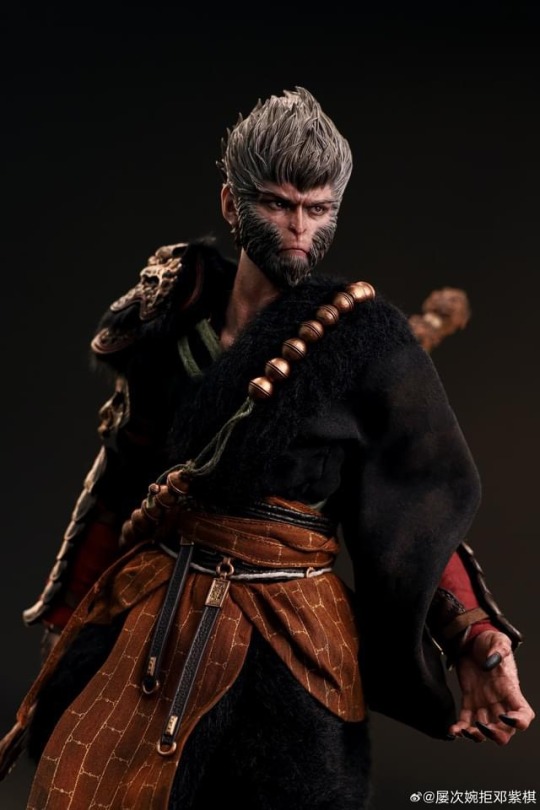
amazing right? I want one too.
The description states that the figure is 40cm tall (according to playasia)
The figure is made by Queen Studio, specifically the INART team that makes 1:6 figures.
So we know that the figure is 40cm tall. It is not clear if that includes stand or not, and I was not able to find any information how tall the stand is
On another website (which I don't want to name because I don't know how serious the website is) lists up the figure as 315mm/31.5cm

If that is the height of the actual figure without stand, and it's a 1:6 figure, that means 31.5cm * 6 = 189 cm
So that means it is very possible Destined One/Sun Wukong is 189 cm / 6 feet 2 inch tall.
that is TALL. a lot taller than I thought he would be tbh LOL cause in the books he is usually described as the shortest (cause well, monkey)
which ALSO means.

Wukong better be paying for her chiropractor with the amount of crancking her neck up she has to do.
#the ham talks#you know you are down bad when you go down a rabbit hole to figure out the height of a fictional character#just to see how big the height difference is between them and your OC#so yeah anyway. take this all witha grain of salt.#I love height difference but I also think it's cute if Wukong was a wee bit shorter than my OC#black myth wukong#sun wukong#sun wukong x oc#sun wukong x reader#black myth wukong x reader#black myth rambling
393 notes
·
View notes
Text
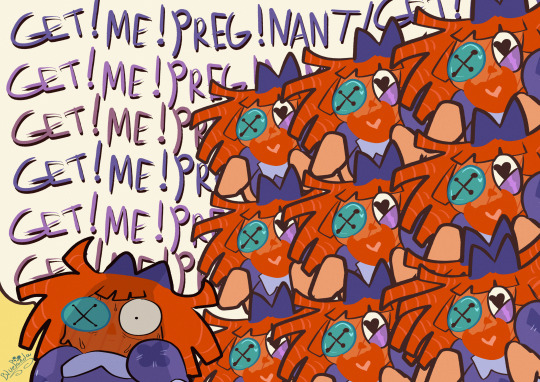
PregnancyMaxxing(inspired by @the-mic-drop and @actuallyjustabiscuit 's fuckin' hilarious comments on the Fallen Over comic)
#the amazing digital circus#tadc#ragatha#tadc ragatha#buttonblossom#ragapom#the amazing digital comic#my art#suggestive#cw suggestive#pomni will take the hint eventually maybe#and then she will attempt to...yeah!! keyword attempt#anyway#laughed for a good 5 minutes when I saw those notes#ya just can't get quality comments like that on twatter no siree#y'all made my night thamk you!#rambling in the tags
895 notes
·
View notes
Text
exam 5 for me... tomorrow!
honestly have been feeling really nervous for this exam since my classmates have either failed it or just barely passed. and i had less time to study this time around because i rushed to book the exam.
so i drew this little encouragement early cuz i need the reminder that no matter what happens tomorrow, i did what i could and i didn't compromise on my boundaries—and that is its own victory.
and i hope that you'll be reminded to celebrate your own big and small victories too!
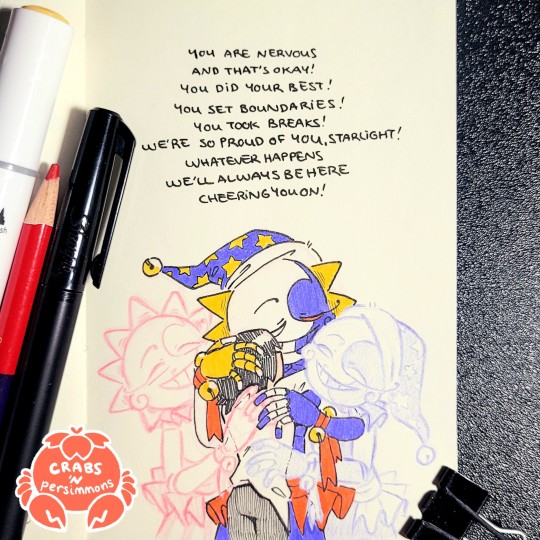
"You are nervous and that's okay! You did your best! You set boundaries! You took breaks! We're so proud of you, Starlight! Whatever happens, we'll always be here, cheering you on!"
#fnaf sun#fnaf eclipse#fnaf moon#fnaf dca#dca fandom#crab art#bright colours#traditional art#self-insert#my OC Esther#on a funnier note (gonna ramble)#i realized today that i could technically bring a sprite to drink in my exam#we're only allowed water in a clear drink container without any labels#so like... sprite is clear enough to work right?#and if they ask about the bubbles i'll just say it's sparking water#(i hate sparkling water but they don't need to know that)#but yeah might do that cuz i think the sugars will do me some good#3 hour exams are inhumane#anyways going to sleep now because i need sleep more than sugar#the worst thing that could happen is i fail and i have to pay another $115 to retake the exam and i receive the disappointment of my mom#i could buy a sun and moon plushie with that money#maybe even an eclipse plushie too#so the stakes are pretty high i think#if i pass i'll buy those plushies hehe#maybe just one for now because i still have more payments to make for my program#okay okay no more rambling going to sleep now
754 notes
·
View notes
Text
you know. I think the reasons it feels so literally narratively wrong when people refer to charles as being straight (such as in interviews where his love life comes up and so on) are that A) he’s never deemed outright straight in the show, so it’s just an assumption that he must be straight by default (which is silly in a show like this), and B) what he says following edwin’s confession. I know I’m biased, but even when I try to look at it as neutrally as possible, the way he reacts in general and the specific words he uses just don’t sound right when you imagine them being said by a Totally Definitely Straight guy.
first of all if you actually listen to it instead of absorbing the scene superficially it’s not particularly a rejection at all, and the actors have stated that themselves– it’s not him saying no, it’s him saying “I can’t give you an answer right now, but I will eventually”. that’s not an interpretation, that’s literally just the truth of what he said (and again, the actors agree). can you imagine a straight guy saying that, or possibly even more damning, “we have literally forever to figure out the rest [“the rest” meaning anything that goes beyond the kind of love charles already solidly has for him]”.
imagine you’re a straight man who’s unwaveringly confident in his orientation and your gay best friend confesses his feelings for you. you would not respond with the implication there is a “the rest” to figure out. since the main, obvious obstacle would be your solid lack of attraction to men, that’d probably be essential to your response– it wouldn’t be a “I can’t say–“ it’d be a “I can’t be–“. and on top of all that, I feel like the whole thing would have to sound far more apologetic– “I’m sorry, I love you and that’ll never change, but I just can’t love you the way that you love me.” something like that, right?
tldr: this is a rare instance in television where assuming a character is straight by default makes Less sense than the alternative. and charles’ choice of words in the confession overtly suggest that he is, at the very least, unsure of his orientation.
#rambling#thinking about this cause I saw another post about how weird it is to see people assume him to be straight and consider his being bi#more of a fandom headcanon- ie; less legitimate. and also that he just seems bi to such an extent that it doesn’t feel like a headcanon–#and I am here to say that yeah. he feels that way for a reason. and that reason is because he has not been portrayed in this show as a#straight character. like just flat out. that’s not to say he’s being overtly portrayed as a bi character (yet) either BUT I think it is#completely within reason to say he has been overtly ambiguous. and rarely does that mean a character is going to end up being straight.#anyway I have brainrot I need to go. do something. and get off my phone probably#charles#charles rowland#dead boy detectives#IN MY DEFENSE I am literally a film studies major. analyzing characters and scenes and etc. is kinda. what i do
462 notes
·
View notes
Text
Chat have we discussed drunk chess with cherik cause i just think. That would be the darnedest silliest thing they could do
#xmen#xmen first class#xmen dofp#cherik#charles xavier#erik lehnsherr#snap chats#sorry still thinking about dofp and i reminded myself of the plane scene#the idea of drunk chess sounds so stupid fun i wish i could play drunk chess#‘snap how do you play drunk chess’ simple !!!! every piece you lose you take a shot#anyway i think itd be silly …….#id like to do something with that idea but i still have to decide on execution#omg xmen fandom hasnt seen my twelve million ‘i wanna draw this so bad’ tags yet#but yeah i sy tht a lot </3 so many things i wanna draw all the time#either that or write …. but i draw more#i love comic makin. and i blame these damned comics for gettin me into it what tha hell !!!#ok im done rambling i wish i had more to say but i dont#i lied i do. this doesnt have to be after erik apologizes on the plane this could be lit any damn time they play#i just live for the progression of them Trying to play semi seriously for a solid twenty minutes before they lose it#and now they wont stop giggling and being stupid asses#theyre still trying to play but ‘trying’ is doing a lot of heavy lifting#imagine it with me chat … itd be so beautiful i could cry frankly#ok my classes are done for today im gonna sit in my room and think of cherik#maybe ill TRY to draw this … if not then def somethin at least
285 notes
·
View notes